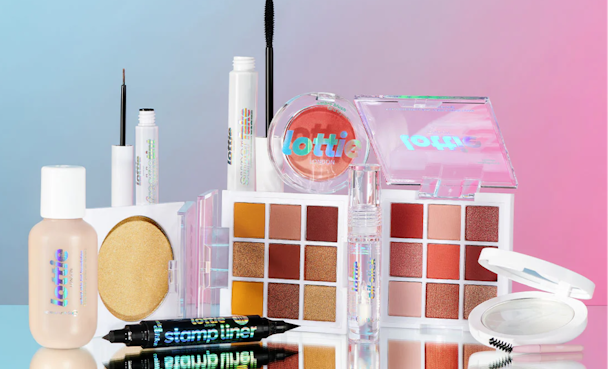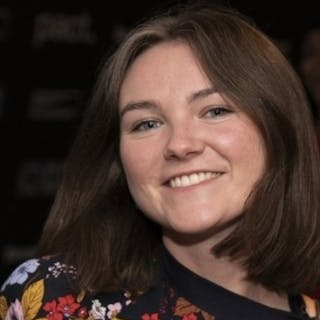Brand-building takes a backseat to sales for marketers in 2024, says Lottie London CMO
Despite the latest IPA Bellwether report painting an optimistic picture for marketing budgets in 2024, tough retail conditions won’t make this a reality for most brands, says Nora Zukauskaite, a judge of this year’s The Drum Marketing Awards.

Gen Z cosmetics brand Lottie London / Lottie London
Nora Zukauskaite, the global marketing director at cosmetic group Brand Agency London, owner of Gen Z favorites Lottie London and I Am Proud, says advertisers are increasingly prioritizing sales tactics over long-term brand-building in order to survive the ongoing economic downturn.
“Marketers are constantly in this hot seat of sales, sales, sales, fast, fast, fast...” she says. “When it comes to brand-building, awareness and the long-term, however, nobody cares – especially when times are so uncertain.”
Zukauskaite’s comments are at odds with the latest IPA Bellwether report, which claims that over a quarter of marketers saw their budgets revised upwards in the final quarter of 2023. “I have seen the predictions that marketers are going to have bigger budgets and spend more, but I haven’t seen this at all because the retail environment is getting more complicated.”
Securing a deal with a retailer is a hard enough task, she explains, and then meeting their high targets is another. “There are very tough conversations when you are in the retail environment among the big brands... Retailers are shortening the time they let you perform and demand a lot very quickly. So you need to sell more and when you need to sell more, performance gets the biggest chunk of money.”
The knock-on impact for marketers then, she says, is that they are expected to switch to short-term sales tactics.
TikTok as the answer to driving sales
Brand Agency London was founded in 2009, first with Ciaté, followed By Lottie London in 2015 and I Am Proud in 2020. Over that time, each of its brands has used Instagram and Facebook to grow awareness, but Zukauskaite says TikTok is a different game altogether.
“TikTok is the only social media platform where you can see the impact of viral content and in-store or online sales – that has never happened before.”
The cosmetic group’s TikTok journey started just like everyone else’s, says Zukauskaite: “We thought, ‘Oh, it’s a singing and dancing app for teens, but no one has money on there they don’t even own a bank card.’ But by Covid, we were like, ‘Oh my god, we need to be on that app... Can anyone sing and dance?’”
@iamproud its giving… SHINE⚡️⚡️ this hair proud hero is for our besties in need of some glazed donut locks ⚡️ #hairproudhero #hairproud #cvs #fyp ♬ loki.4yah -
Then, the next stage was seeing viral moments translate into sales and Zukauskaite remembers a call from Walmart telling her that a blusher had sold out after an influencer mentioned it. “That was the realization that this was working and that people were buying our stuff after seeing that video.”
Even though TikTok’s commerce platform has only been live in the UK since September, Brand Agency London is already seeing big gains, she says. “We are on the next stage of our TikTok journey, which is through social commerce. That is becoming a really big revenue driver and revenue stream for us and in some months can be 30% of DTC revenue in the UK.”
Zukauskaite, who is a judge at The Drum Awards for Marketing 2024, adds that she has observed the “explosion” of brands developed purely for social commerce, with TikTok Shop leading the way. “Within beauty, we will see more and more brands being created this way versus traditional long-term brand building purpose-led style.”
The brand-building tactics are completely different from the traditional strategies the big multinational companies have been employing for decades, Zukauskaite explains. There is a big unknown, however, over how these brands will fare in the long term.
What content works?
Zukauskaite counts herself lucky to be a marketing director at a privately owned brand and not answerable to shareholders. “We can be quite brave in the type of content we put out there,” she says, which is needed for a platform where ideas need to be “attention-grabbing and thumb-stopping.”
She is also considering how to use regular TikTokers who aren’t influencers, having observed how the algorithm favors this content over celebrities. “That type of content is having much more impact on the consideration or purchase itself, which is very interesting as that hadn’t happened before. Previously, it was very much the more followers you have or the more famous you are, the more influential you are.”
She says Gen Z trusts their peers more than influencers as they understand the creator economy; the demographic knows it as essentially a “media buy” and they know influencers are being paid for it.
Showing behind-the-scenes at a brand is another tactic that resonates with this “curious” Gen Z demographic and Brand Agency London publishes content that shows everything from product development and creation to office culture.
“They want to know what you stand for, what you represent and what your ethos is, so it’s helpful letting your community come inside and see the other side of the brand, not just the perfect Instagram picture.”
Zukauskaite was recently joined at The Drum Predictions by Skyscanner’s digital marketing lead, Aoife O’Toole, and Kantar’s head of media insights, Hannah Walley. Find out what they see as the biggest priorities for brand marketers in 2024.

